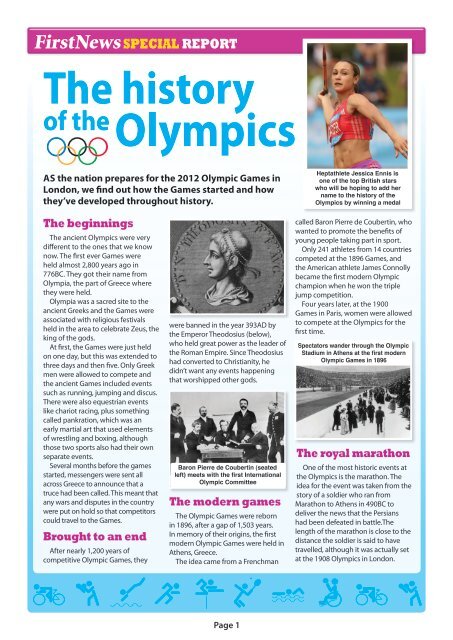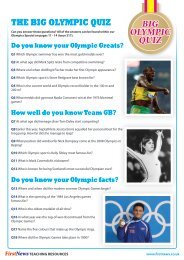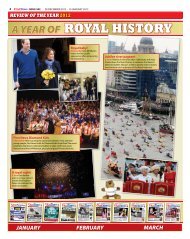History of the Olympics Special Report and Quiz.pdf - First News
History of the Olympics Special Report and Quiz.pdf - First News
History of the Olympics Special Report and Quiz.pdf - First News
You also want an ePaper? Increase the reach of your titles
YUMPU automatically turns print PDFs into web optimized ePapers that Google loves.
<strong>First</strong><strong>News</strong> SPECIAL REPORT<br />
The history<br />
<strong>of</strong> <strong>the</strong><br />
<strong>Olympics</strong><br />
AS <strong>the</strong> nation prepares for <strong>the</strong> 2012 Olympic Games in<br />
London, we find out how <strong>the</strong> Games started <strong>and</strong> how<br />
<strong>the</strong>y’ve developed throughout history.<br />
Heptathlete Jessica Ennis is<br />
one <strong>of</strong> <strong>the</strong> top British stars<br />
who will be hoping to add her<br />
name to <strong>the</strong> history <strong>of</strong> <strong>the</strong><br />
<strong>Olympics</strong> by winning a medal<br />
The beginnings<br />
The ancient <strong>Olympics</strong> were very<br />
different to <strong>the</strong> ones that we know<br />
now. The first ever Games were<br />
held almost 2,800 years ago in<br />
776BC. They got <strong>the</strong>ir name from<br />
Olympia, <strong>the</strong> part <strong>of</strong> Greece where<br />
<strong>the</strong>y were held.<br />
Olympia was a sacred site to <strong>the</strong><br />
ancient Greeks <strong>and</strong> <strong>the</strong> Games were<br />
associated with religious festivals<br />
held in <strong>the</strong> area to celebrate Zeus, <strong>the</strong><br />
king <strong>of</strong> <strong>the</strong> gods.<br />
At first, <strong>the</strong> Games were just held<br />
on one day, but this was extended to<br />
three days <strong>and</strong> <strong>the</strong>n five. Only Greek<br />
men were allowed to compete <strong>and</strong><br />
<strong>the</strong> ancient Games included events<br />
such as running, jumping <strong>and</strong> discus.<br />
There were also equestrian events<br />
like chariot racing, plus something<br />
called pankration, which was an<br />
early martial art that used elements<br />
<strong>of</strong> wrestling <strong>and</strong> boxing, although<br />
those two sports also had <strong>the</strong>ir own<br />
separate events.<br />
Several months before <strong>the</strong> games<br />
started, messengers were sent all<br />
across Greece to announce that a<br />
truce had been called. This meant that<br />
any wars <strong>and</strong> disputes in <strong>the</strong> country<br />
were put on hold so that competitors<br />
could travel to <strong>the</strong> Games.<br />
Brought to an end<br />
After nearly 1,200 years <strong>of</strong><br />
competitive Olympic Games, <strong>the</strong>y<br />
were banned in <strong>the</strong> year 393AD by<br />
<strong>the</strong> Emperor Theodosius (below),<br />
who held great power as <strong>the</strong> leader <strong>of</strong><br />
<strong>the</strong> Roman Empire. Since Theodosius<br />
had converted to Christianity, he<br />
didn’t want any events happening<br />
that worshipped o<strong>the</strong>r gods.<br />
Baron Pierre de Coubertin (seated<br />
left) meets with <strong>the</strong> first International<br />
Olympic Committee<br />
The modern games<br />
The Olympic Games were reborn<br />
in 1896, after a gap <strong>of</strong> 1,503 years.<br />
In memory <strong>of</strong> <strong>the</strong>ir origins, <strong>the</strong> first<br />
modern Olympic Games were held in<br />
A<strong>the</strong>ns, Greece.<br />
The idea came from a Frenchman<br />
called Baron Pierre de Coubertin, who<br />
wanted to promote <strong>the</strong> benefits <strong>of</strong><br />
young people taking part in sport.<br />
Only 241 athletes from 14 countries<br />
competed at <strong>the</strong> 1896 Games, <strong>and</strong><br />
<strong>the</strong> American athlete James Connolly<br />
became <strong>the</strong> first modern Olympic<br />
champion when he won <strong>the</strong> triple<br />
jump competition.<br />
Four years later, at <strong>the</strong> 1900<br />
Games in Paris, women were allowed<br />
to compete at <strong>the</strong> <strong>Olympics</strong> for <strong>the</strong><br />
first time.<br />
Spectators w<strong>and</strong>er through <strong>the</strong> Olympic<br />
Stadium in A<strong>the</strong>ns at <strong>the</strong> first modern<br />
Olympic Games in 1896<br />
The royal marathon<br />
One <strong>of</strong> <strong>the</strong> most historic events at<br />
<strong>the</strong> <strong>Olympics</strong> is <strong>the</strong> marathon. The<br />
idea for <strong>the</strong> event was taken from <strong>the</strong><br />
story <strong>of</strong> a soldier who ran from<br />
Marathon to A<strong>the</strong>ns in 490BC to<br />
deliver <strong>the</strong> news that <strong>the</strong> Persians<br />
had been defeated in battle.The<br />
length <strong>of</strong> <strong>the</strong> marathon is close to <strong>the</strong><br />
distance <strong>the</strong> soldier is said to have<br />
travelled, although it was actually set<br />
at <strong>the</strong> 1908 <strong>Olympics</strong> in London.<br />
Page 1
<strong>First</strong><strong>News</strong> SPECIAL REPORT<br />
The distance from Windsor Castle to <strong>the</strong> Olympic<br />
stadium in White City was 42.195km (26 miles 385 yards),<br />
<strong>and</strong> it was agreed from 1924 onwards that this would be<br />
<strong>the</strong> st<strong>and</strong>ard distance for <strong>the</strong> marathon.<br />
Moving on<br />
The 1912 Games in Stockholm, Sweden, introduced<br />
some technology that had never been used at an<br />
<strong>Olympics</strong> before: automatic timing devices <strong>and</strong><br />
photo finishes.<br />
They also featured an unbelievable wrestling match<br />
between Russia’s Martin Klein <strong>and</strong> Finl<strong>and</strong>’s Alfred<br />
Asikainen. Their middleweight semi-final lasted for an<br />
epic 11 hours!<br />
<strong>First</strong> flag<br />
The Games in 1916 were set to be held in Berlin,<br />
Germany, but were cancelled because <strong>of</strong> World War I.<br />
Instead, <strong>the</strong> Games were next held in Antwerp, Belgium,<br />
in 1920. These Games were important because it was <strong>the</strong><br />
first appearance <strong>of</strong> <strong>the</strong> Olympic flag with its five rings.<br />
<strong>First</strong> Winter Games<br />
1924 saw <strong>the</strong> first ever<br />
Olympic Winter Games<br />
take place in Chamonix,<br />
France. The Canadian<br />
ice hockey team put<br />
in one <strong>of</strong> <strong>the</strong> most<br />
dominant performances<br />
in Olympic history<br />
when <strong>the</strong>y won <strong>the</strong><br />
tournament by scoring<br />
122 goals <strong>and</strong> only<br />
letting in three.<br />
At <strong>the</strong> regular 1924<br />
summer <strong>Olympics</strong>,<br />
American athlete<br />
Johnny Weissmuller<br />
won three swimming<br />
Competitors run down Eton High Street<br />
during <strong>the</strong> 1908 Olympic marathon event<br />
American swimmer Johnny<br />
Weissmuller went on to be a<br />
Hollywood star<br />
gold medals plus a bronze in water polo. He won two<br />
more golds in 1928 <strong>and</strong> set 28 world records in his career,<br />
but still became far better known for his performances in<br />
<strong>the</strong> dozen Tarzan movies he starred in.<br />
The flame is lit<br />
The 1928 Games saw <strong>the</strong> Olympic flame lit for <strong>the</strong><br />
very first time. The flame, <strong>and</strong> its journey from Greece,<br />
has now become one <strong>of</strong> <strong>the</strong> most important traditions<br />
<strong>of</strong> <strong>the</strong> Games.<br />
Hitler’s Games<br />
Nazi leader Adolf Hitler<br />
had hoped that <strong>the</strong> Berlin<br />
Games in 1936 would help to<br />
prove his racist <strong>the</strong>ories that<br />
white Germanic people were<br />
superior to o<strong>the</strong>rs. He even<br />
said that he didn’t want Jews<br />
or black people to compete<br />
at <strong>the</strong> Berlin Games, but o<strong>the</strong>r<br />
countries protested.<br />
The black American athlete<br />
Jesse Owens pulled <strong>of</strong>f<br />
<strong>the</strong> best imaginable reply<br />
to Hitler when he won an astonishing quadruple <strong>of</strong> <strong>the</strong><br />
100m, 200m, 4x100m relay <strong>and</strong> long jump.<br />
Games on two continents<br />
The 1956 Games were unusual because <strong>the</strong>y actually<br />
took place on two continents. The <strong>Olympics</strong> that year<br />
were being held in Melbourne, Australia, but <strong>the</strong><br />
country’s quarantine laws were so strict that horses for<br />
<strong>the</strong> equestrian events weren’t allowed in. The solution<br />
was that <strong>the</strong> equestrian events were held in Stockholm,<br />
Sweden, a few months before <strong>the</strong> main Games began.<br />
The Fosbury flop<br />
The legendary<br />
American athlete Jesse<br />
Owens competing at<br />
<strong>the</strong> 1936 Games<br />
The Mexico City <strong>Olympics</strong> in 1968 were revolutionary<br />
for two reasons. The first was <strong>the</strong> attempt to try to stop<br />
Dick Fosbury changed <strong>the</strong> high jump<br />
forever at <strong>the</strong> 1968 Games in Mexico<br />
Page 2
<strong>First</strong><strong>News</strong> SPECIAL REPORT<br />
any cheating, which meant that this was <strong>the</strong> first Games<br />
where winners had to take a drugs test.<br />
The second revolution came in <strong>the</strong> high jump, when<br />
<strong>the</strong> American athlete Dick Fosbury showed <strong>the</strong> world<br />
his new technique for getting over <strong>the</strong> bar. By running<br />
diagonally <strong>and</strong> jumping backwards, he easily outjumped<br />
his competitors <strong>and</strong> won <strong>the</strong> gold medal. His technique<br />
came to be known as <strong>the</strong> ‘Fosbury flop’ <strong>and</strong> it is still used<br />
by all <strong>the</strong> best high jumpers to this day.<br />
Tragedy in Munich<br />
At <strong>the</strong> 1972 Games in Munich, Germany, US swimmer<br />
Mark Spitz won an extraordinary seven gold medals<br />
<strong>and</strong> set seven world records. Unfortunately, his amazing<br />
achievement was overshadowed by <strong>the</strong> saddest <strong>and</strong><br />
most horrifying incident in Olympic history.<br />
During <strong>the</strong> second week <strong>of</strong> competition, eight<br />
members <strong>of</strong> <strong>the</strong> Palestinian terrorist group Black<br />
September broke into <strong>the</strong> Israeli team’s section <strong>of</strong> <strong>the</strong><br />
Olympic Village <strong>and</strong> took several hostages. Their aim<br />
was to negotiate for <strong>the</strong> release <strong>of</strong> Palestinian prisoners,<br />
but <strong>the</strong> bloody incident ended with <strong>the</strong> deaths <strong>of</strong><br />
11 Israeli athletes <strong>and</strong> coaches, a policeman <strong>and</strong> five <strong>of</strong><br />
<strong>the</strong> terrorists.<br />
<strong>of</strong> <strong>the</strong> event <strong>and</strong> <strong>the</strong> athlete made <strong>the</strong> story a worldwide<br />
sc<strong>and</strong>al.<br />
Ben Johnson (left) was <strong>the</strong> first famous drug cheat<br />
Looking ahead<br />
The sports that make up <strong>the</strong> Olympic Games change<br />
over <strong>the</strong> years, as <strong>the</strong>ir popularity goes up <strong>and</strong> down.<br />
In <strong>the</strong> 2016 <strong>Olympics</strong> in Rio de Janeiro, Brazil, golf <strong>and</strong><br />
rugby sevens will be new additions to <strong>the</strong> Games. Both<br />
sports have been part <strong>of</strong> <strong>the</strong> <strong>Olympics</strong> before, but not for<br />
around 100 years.<br />
Rugby sevens will be one <strong>of</strong> two new<br />
sports at <strong>the</strong> 2016 Games in Brazil<br />
Swimmer Mark Spitz was <strong>the</strong> star<br />
<strong>of</strong> <strong>the</strong> 1972 Games in Germany<br />
A record <strong>and</strong> a sc<strong>and</strong>al<br />
The men’s 100m final is always one <strong>of</strong> <strong>the</strong> most<br />
popular Olympic events, so <strong>the</strong> public were thrilled<br />
when Canadian sprinter Ben Johnson set a world record<br />
on his way to a gold medal in Seoul, South Korea, in<br />
1988. The joy soon turned sour when it was revealed<br />
that Johnson had been taking illegal substances to make<br />
him quicker <strong>and</strong> had failed a drugs test. Although o<strong>the</strong>r<br />
athletes had failed tests before Johnson, <strong>the</strong> high pr<strong>of</strong>ile<br />
<strong>First</strong> <strong>News</strong><br />
Olympic<br />
Teaching<br />
Resources<br />
<strong>First</strong><strong>News</strong><br />
OLYMPIC<br />
SPECIAL<br />
To download more <strong>First</strong> <strong>News</strong><br />
Olympic resources visit<br />
www.firstnews.co.uk/teachers<br />
Page 3
776BC<br />
HISTORY OF THE OLYMPICS<br />
393AD<br />
How much do you know about <strong>the</strong> history<br />
<strong>of</strong> <strong>the</strong> Olympic Games?<br />
HAVE a go at this <strong>History</strong> <strong>of</strong> <strong>the</strong> <strong>Olympics</strong> <strong>Quiz</strong> to find out.<br />
All <strong>the</strong> answers can be found in <strong>the</strong> <strong>First</strong> <strong>News</strong> <strong>History</strong> <strong>of</strong> <strong>the</strong><br />
<strong>Olympics</strong> <strong>Special</strong> <strong>Report</strong>.<br />
<strong>First</strong><strong>News</strong><br />
HISTORY<br />
OF THE<br />
OLYMPICS<br />
QUIZ<br />
PART A:<br />
A1) Which ancient Greek god were <strong>the</strong> ancient<br />
<strong>Olympics</strong> held to celebrate?<br />
A2) Who was allowed to compete in <strong>the</strong> ancient<br />
Olympic Games?<br />
A3) What was <strong>the</strong> reason for starting <strong>the</strong> modern<br />
Olympic Games?<br />
A4) How many athletes from how many countries<br />
took part in <strong>the</strong> first modern Olympic Games in<br />
1896?<br />
A5) When were women first allowed to complete<br />
in <strong>the</strong> <strong>Olympics</strong>?<br />
A6) When <strong>and</strong> where were automatic timing<br />
devices <strong>and</strong> photo finishes first used in <strong>the</strong> Games?<br />
A7) How long did <strong>the</strong> middle weight semi-final<br />
wrestling match last for in 1912 Games?<br />
A8) Why were <strong>the</strong> 1916 Games cancelled?<br />
A9) How many gold medals did Jesse Owens win<br />
in <strong>the</strong> 1936 Berlin Games?<br />
A10) How did Jesse Owens prove Hitler wrong?<br />
A11) What was <strong>the</strong> name <strong>of</strong> <strong>the</strong> terrorist group<br />
that caused <strong>the</strong> tragedy at <strong>the</strong> 1972 Munich<br />
Games?<br />
A12) Which two sports will become Olympic<br />
sports again in Brazil in 2016?<br />
PART B PEOPLE:<br />
Who are <strong>the</strong>se people <strong>and</strong> why are <strong>the</strong>y famous<br />
in Olympic history?<br />
B1<br />
B4<br />
B3<br />
B2<br />
B5<br />
PART C NUMBERS: How do <strong>the</strong>se numbers feature in Olympic history?<br />
C1) 776 C2) 1896 C3) 26 miles <strong>and</strong> 385 yards C4) 5 C5) 1928 C6) 7 <strong>and</strong> 7<br />
1896<br />
2012<br />
Page 4
776BC<br />
HISTORY OF THE OLYMPICS<br />
393AD<br />
How much do you know about <strong>the</strong> history <strong>of</strong><br />
<strong>the</strong> Olympic Games?<br />
HAVE a go at this <strong>History</strong> <strong>of</strong> <strong>the</strong> <strong>Olympics</strong> <strong>Quiz</strong> to find out.<br />
Write your answers on this sheet.<br />
All <strong>the</strong> answers can be found in <strong>the</strong> <strong>First</strong> <strong>News</strong> <strong>History</strong> <strong>of</strong> <strong>the</strong><br />
<strong>Olympics</strong> <strong>Special</strong> <strong>Report</strong>.<br />
<strong>First</strong><strong>News</strong><br />
HISTORY<br />
OF THE<br />
OLYMPICS<br />
QUIZ<br />
PART A:<br />
A1 ..............................................................................<br />
A2 ..............................................................................<br />
A3 ..............................................................................<br />
A4 ..............................................................................<br />
A5 ..............................................................................<br />
A6 ..............................................................................<br />
A7 ..............................................................................<br />
A8 ..............................................................................<br />
A9 ..............................................................................<br />
A10 ...........................................................................<br />
A11 ...........................................................................<br />
A12 ...........................................................................<br />
PART B PEOPLE:<br />
B1 ...............................................<br />
......................................................<br />
......................................................<br />
B2 ...............................................<br />
......................................................<br />
......................................................<br />
B3 ...............................................<br />
......................................................<br />
......................................................<br />
B4 ...............................................<br />
......................................................<br />
......................................................<br />
B5 ...............................................<br />
......................................................<br />
......................................................<br />
PART C NUMBERS:<br />
C1 ..............................................................................<br />
C2 ..............................................................................<br />
C3 ..............................................................................<br />
C4 ..............................................................................<br />
C5 ..............................................................................<br />
C6 ..............................................................................<br />
1896<br />
2012<br />
Page 5
776BC<br />
HISTORY OF THE OLYMPICS<br />
393AD<br />
<strong>History</strong> <strong>of</strong> <strong>the</strong><br />
<strong>Olympics</strong> <strong>Quiz</strong> Answers<br />
<strong>First</strong><strong>News</strong><br />
HISTORY<br />
OF THE<br />
OLYMPICS<br />
QUIZ<br />
PART A:<br />
A1<br />
A2<br />
A3<br />
A4<br />
A5<br />
A6<br />
A7<br />
A8<br />
A9<br />
A10<br />
A11<br />
A12<br />
Zeus<br />
Greek men<br />
to promote <strong>the</strong> benefits <strong>of</strong> young people<br />
taking part in sport<br />
241 athletes from 14 countries<br />
1900 Games in Paris<br />
1912 Games in Stockholm, Sweden<br />
11 hours<br />
because <strong>of</strong> World War One<br />
4 gold medals<br />
Hitler believed white Germanic people were superior to<br />
o<strong>the</strong>rs. Jesse Owens was a black athlete <strong>and</strong> he won four<br />
gold medals in four <strong>of</strong> <strong>the</strong> main athletics events<br />
Black September<br />
rugby sevens <strong>and</strong> golf<br />
PART B PEOPLE:<br />
B1 Emperor Theodosius<br />
He banned <strong>the</strong> ancient Olympic<br />
Games in 393AD because he<br />
converted to Christianity.<br />
B2 Baron Pierre de Coubertin<br />
He had <strong>the</strong> idea for <strong>the</strong> modern<br />
Olympic Games.<br />
B3 Johnny Weissmuller<br />
An American gold medal<br />
winning swimmer who went on<br />
to become a famous film star in<br />
<strong>the</strong> Tarzan films.<br />
B4 Dick Fosbury<br />
He invented a new technique for<br />
<strong>the</strong> high jump <strong>and</strong> won <strong>the</strong> 1968<br />
gold medal.<br />
B5 Ben Johnson<br />
The first famous drug cheat. The<br />
sprinter set a world record <strong>and</strong> won <strong>the</strong><br />
100 m. He was stripped <strong>of</strong> his medal<br />
when he was found to have cheated.<br />
PART C NUMBERS:<br />
C1<br />
C2<br />
C3<br />
776BC is <strong>the</strong> year <strong>the</strong> first Games took place in<br />
Ancient Greece.<br />
1896 is <strong>the</strong> year <strong>the</strong> first modern Games took place.<br />
26 miles <strong>and</strong> 365 yards is <strong>the</strong> distance <strong>of</strong> <strong>the</strong><br />
marathon.<br />
C4<br />
C5<br />
C6<br />
5 is <strong>the</strong> number <strong>of</strong> Olympic rings. The symbol was<br />
first used in 1920.<br />
1928 is <strong>the</strong> year <strong>the</strong> Olympic flame was lit for <strong>the</strong><br />
first time.<br />
7 gold medals <strong>and</strong> 7 world records were won <strong>and</strong><br />
set by <strong>the</strong> swimmer, Mark Spitz in <strong>the</strong> 1972 Games.<br />
1896<br />
2012<br />
Page 6
















